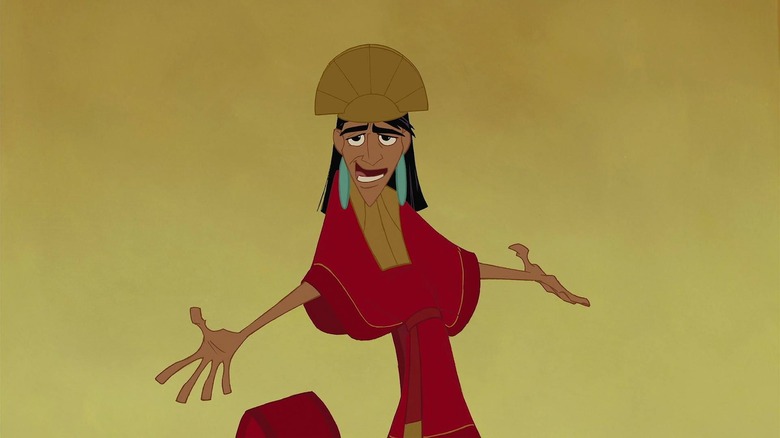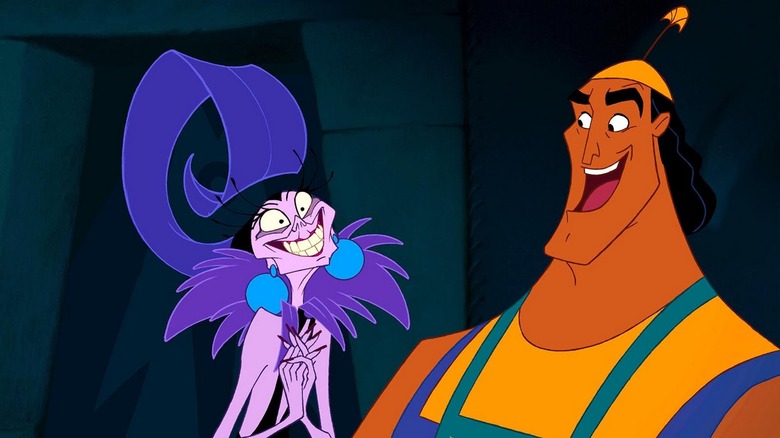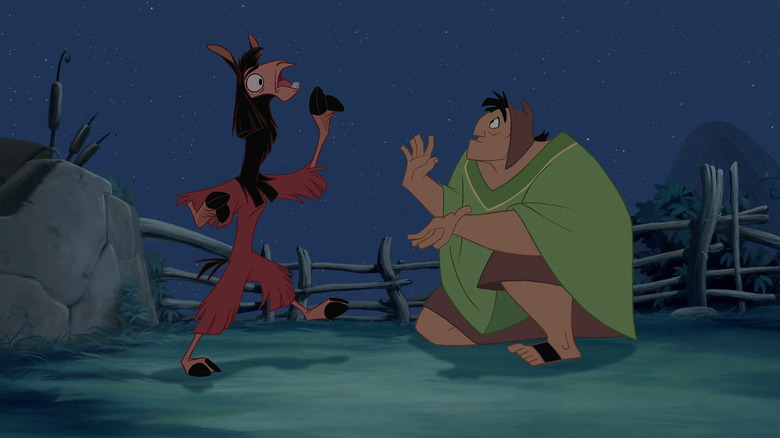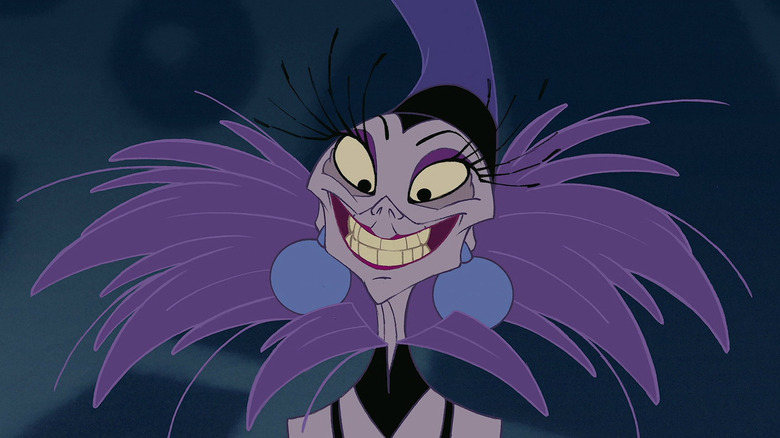The Original Idea For Emperor's New Groove Featured A Lot More Owen Wilson
At last count, Disney Animation Studios has canonized 61 of their features. The central "Disney Canon" refers to an ill-defined section of the studio's animated feature output that, as far as one might surmise, serves as examples of the studio's preferred "house style." The Disney Animated Canon includes several animation styles and media, of course, but the 61 films in question are considered to be "official." Canonized Disney films cannot be co-productions, they must be pointedly toyetic, and are typically not auteur-driven. One might not be able to, for instance, recall the directors of "Cinderella" (1950) off the top of their head. Their names, incidentally, are Clyde Geronimi, Wilfred Jackson, and Hamilton Luske. The trio also directed Disney's animated films "Lady and the Tramp," "Peter Pan," and "Alice in Wonderland."
For Disney, though, the company is the auteur, and weird, smaller projects tend to be excluded from the Disney Canon. "A Goofy Movie," for instance, is not one of the 61 films mentioned. Nor is "The Nightmare Before Christmas," "Pete's Dragon," "Who Framed Roger Rabbit?," nor the animated remakes of "The Jungle Book" and "The Lion King."
This stringent brand protection makes the studio's stranger, out-of-character productions stand out all the more. In 2000, Disney's large, expensive, well-advertised release was Ralph Zondag's and Eric Leighton's high-tech CGI adventure "Dinosaur," a film that is now largely forgotten. The one that has survived slightly more strongly into the pop consciousness was Mark Dindal's curious Tex Avery-inspired slapstick film "The Emperor's New Groove" starring David Spade, John Goodman, Eartha Kitt, and Patrick Warburton. Dindal's wacky comedy is, of Disney's 2000's output, one of the better films.
The Kingdom of the Son
"The Emperor's New Groove" is about Kuzco (Spade), the spoiled, bratty teen king of the Incan Empire. Shallow and rude, Kuzco plans on displacing Pacha (Goodman), a gentle farmer, in order to build an amusement park. The evil Yzma (Kitt), however, desires the throne and plots to poison Kuzco at a meal with the help of her thickheaded but affable henchman Kronk (Warburton). Yzma's poison is accidentally swapped for a magic potion, however, and Kuzco is transformed into a llama. As a llama, Kuzco is taken to the countryside where Pacha lives. The llama and the farmer must make a dangerous journey back to reclaim the throne.
In a 2021 oral history with Vulture, the animators and actors behind "Groove" talk about its long development — it was originally meant to be a more serious drama called "The Kingdom of the Son" — and how it was originally set to star Owen Wilson.
Roger Allers, co-director of the 1994 film version of "The Lion King" said that his first film's success led Disney to consider tales from other continents than western Europe (where many of the studio's celebrated fairy tale films hailed from). It was Allers' idea to make a film about the Incas, and his idea to include a then-just-breaking-out Wilson:
"Owen Wilson was the lead, the llama herder, Pacha. I think he had just done 'Bottle Rocket,' so no one really knew him, but he had this kind of slow, drawly way of speaking, which felt like an equivalent of someone from out in the sticks. And of course, we were familiar with David Spade from 'Saturday Night Live.' They were a fun contrast."
"Bottle Rocket," released in 1996, was Wilson's first film.
Your normal, annoying, sarcastic voice
Spade, meanwhile, was attached to the project from early on, and recalled the original story. Evidently, "The Kingdom of the Son" was meant to be something of a "The Prince and the Pauper" style story, wherein a citizen and a member of royalty swap roles. Not only was Wilson attached at that point, but so too was Carla Gugino. Earth Kitt was also already taking part. Spade, meanwhile, was given his character description early on, and it seemingly did not change as the project did. Spade said:
"It was me and Owen Wilson. We were going to switch jobs. I was an emperor and he was a peasant, and Carla Gugino was a princess. The first time I did my voice, I was naïvely saying, 'What do you want? This kind of guy? A deep voice? Or an emperor like, Ooh! A highfalutin guy?' And they said, 'No, just your nasally, normal, annoying, sarcastic voice.'"
There are few people who are more masterful with sarcasm than David Spade.
According to story writer Chris Williams, "Kingdom" fell apart for an unremarkable reason: they simply couldn't make the story work. Keeping only Spade, Kitt, and the Incan setting, the filmmakers rebuilt from the ground up. It was at this point a new Pacha was required. Williams sketched him out, and the new film was borne. Williams said:
"What's the opposite of David Spade's Kuzco? I imagined an older character. A bigger, heavier character. A family man, someone who took the responsibility seriously. A selfless character. And I remember drawing this big sort of mountain of a dude, sitting on a little hill with a llama, and saying, 'This is a Pacha that I think could work.'"
The Adam West version
This new version of Pacha required a more patronly voice than Wilson could provide. When they asked themselves who they would want their dad to be, they thought of only one man. According to the film's production manager, Tracey Miller-Zarneke, they settled on John Goodman pretty easily. She said:
"That brainstorm of having Pacha be the father figure that Kuzco never had — once they came up with that, they were like, 'Well, who would be an amazing father that you'd want to have?' John Goodman. I don't remember them talking seriously about anybody else."
In reworking the film afresh, it seemingly became more and more comedic, until it ended up the broad farce it was to eventually become. Indeed, as previously reported in the pages of /Film, there was even to be a wacky conspiracy theorist character played by Adam West, Kitt's co-star from the 1966 TV version of "Batman." Sadly, West's character was ultimately cut.
Dindal, who previously made the hyperkinetic 1930s Hollywood fable "Cats Don't Dance" seemingly pushed Disney in a new direction with "The Emperor's New Groove," and the studio began to lean more and more heavily into comedy. Dindal even returned to direct the 2005 CGI feature "Chicken Little." Sadly, none of the subsequent films grabbed audiences, and the studio spent the better part of the 2000s producing dud after dud. Flops like "Treasure Planet," "Atlantis: The Lost Empire," and "Meet the Robinsons" may have their scant fans, but few recall "Dinosaur," "Brother Bear," "The Wild," "Home on the Range," or "Bolt" with any fondness. "The Emperor's New Groove" may be seen as the final film in the Disney Renaissance.



